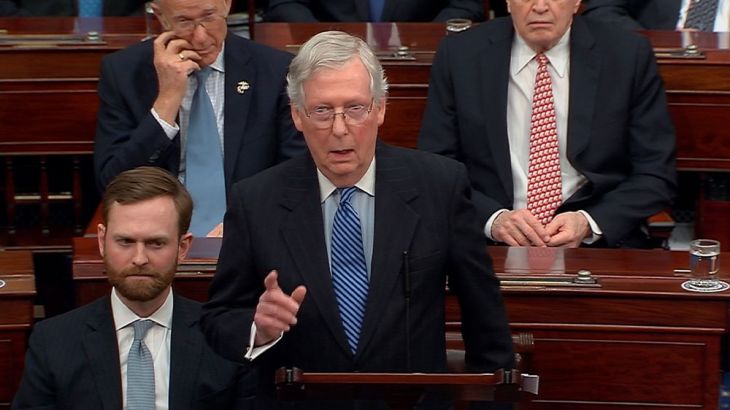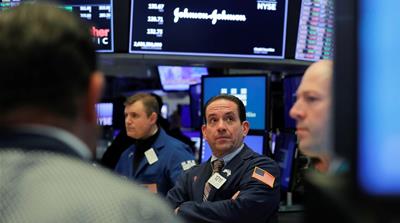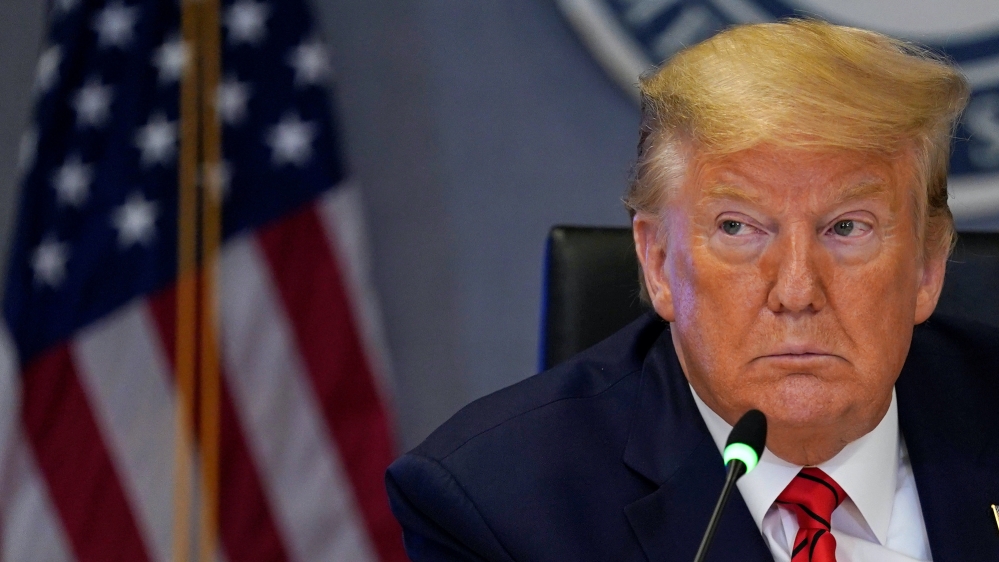US Senate approves $2 trillion coronavirus rescue bill
The largest economic relief bill in history heads to the House, where it must pass before landing on Trump’s desk.

Washington, DC – The United States‘s Senate overwhelmingly approved a $2 trillion economic rescue bill on Wednesday to help lift the economy and address the coronavirus pandemic.
The Senate vote ratifies a political agreement between leading Senate Democrats, Republicans and the White House and sets the stage for final passage likely later this week.
Keep reading
list of 3 itemsAutomakers heed calls to retool operations for coronavirus fight
World on lockdown: Business activity collapses at record pace
The legislation is now under review in the US House of Representatives. If passed, it will be the largest rescue package ever approved by Congress. The president said he would sign the bill as soon as it reaches his desk.
“It’s good news for the doctors and nurses in emergency rooms around the country who are waiting for more masks and more funding,” said Senate Majority Leader Mitch McConnell.
“It will rush new resources onto the front lines of our nation’s healthcare fight and it will inject trillions of dollars of cash into the economy as fast as possible,” the Republican leader added.
US stock markets opened higher on Wednesday, following the announcement of the deal, which was struck in the early morning hours. But the rally lost steam near the close after three Republicans expressed reservations over language in the bill that addressed enhanced unemployment benefits for Americans.
But after hours of negotiations on Wednesday, those Republicans were unable to impose changes to the legislation.

House Speaker Nancy Pelosi said she expects to take up the Senate bill under expedited procedures in coming days.
“America is facing a grave health crisis with a serious impact on our economy,” Pelosi said in a statement on Wednesday morning.
“This bipartisan legislation takes us a long way down the road in meeting the needs of the American people,” Pelosi said.
The Senate bill does not go as far as House Democrats wanted and Democratic committee chairmen in the House will be reviewing the legislative text, she said.
A vote in the House, whose members left Washington, DC, more than a week ago is not expected until at least Friday.
The legislative package includes:
- $500bn for a Treasury Department lending facility to support US companies, including airlines, with public oversight
- $350bn for small businesses. Current small business loans will be forgiven. Grants will be available to keep employees on payroll for eight weeks
- $100bn for hospitals, nurses and doctors to battle the outbreak
- $150bn for state and local governments
- $300bn in direct payments to most Americans of up to $1,200 per adult and $500 per child within about three weeks. A typical family of four would get $3,400. Individuals making more than $100,000 a year (households making more than $150,000) would not be eligible
- $250bn in federal unemployment benefits of $600 per week for individual employees as well as gig workers and independent contractors in addition to regular state unemployment benefits available for up to four months
“The bill before us is filled with resources to help struggling families, to provide relief to workers and enable businesses to retain their employees during this crisis,” said Senator John Thune, the No 2 Senate Republican.
“This is a pro-worker bill. This is about getting paychecks in the hands of American workers,” Thune added.
The passage in the Senate came after several days of gruelling talks between Senate and House leaders, Treasury secretary and other White House officials.
“After sleep-deprived nights and marathon negotiations, we have a bipartisan agreement on the largest rescue package in American history,” Senate Democratic leader Chuck Schumer said on Wednesday morning.
‘Unemployment insurance on steroids’
The Senate stimulus bill would allow businesses to put employees on paid furlough for up to four months, Schumer said.
“We call it unemployment insurance on steroids,” he added. “Every American who is laid off will have their salary remunerated.”
The enormous size of the emergency spending equals roughly 40 percent of the entire $4.6 trillion annual budget of the US government or about 10 percent of the total annual output of the $21-trillion US economy.
Over the weekend and as talks dragged into Monday and Tuesday, Republicans and Democrats had blamed each other for delays as tempers flared and the sense of urgency grew as evidence of the scope of the crisis mounted daily.
Treasury Secretary Steven Mnuchin told reporters at the White House on Wednesday the relief package would cover damage to the US economy for three months.
“Hopefully we won’t need this for three months. Hopefully, this will be over quicker, but we expect that this is a significant amount of money, if needed, to cover the economy,” Mnuchin said.
Businesses ordered shut
Businesses have been ordered shut in more than a dozen US states encompassing large population centres on the East and West Coasts.
More than 100 million Americans, or about a third of the US population, are living under stay-at-home restrictions ordered by mayors and governors.
Preliminary data on unemployment claims indicate as many as 3.4 million Americans lost their jobs in just the last week which would be the largest one-week job loss in US history.

The number of confirmed coronavirus cases in the US has surged as testing becomes more widely available. More than 65,000 cases have been identified in the US so far, according to a cumulative tally by Johns Hopkins University.
In New York City, the epicentre of the outbreak in the US, concern was rising as authorities prepared for an expected overflow of COVID-19 patients in hospitals.
New York Governor Andrew Cuomo said on Wednesday that the Senate bill does not provide enough for states.
New York faces a $15bn cost for the coronavirus response while the federal relief bill promises the state only $3.5bn.
“How do you plug a $15bbn hole with $3.8bn? You don’t,” he said.